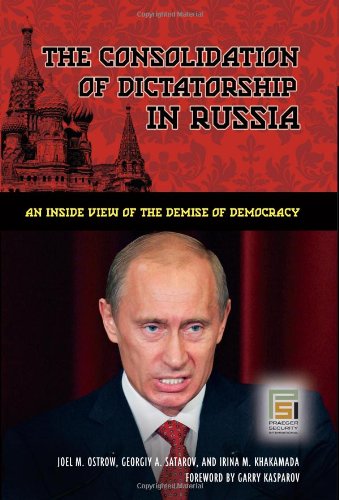Product desciption
The Consolidation Of Dictatorship In Russia An Inside View Of The Demise Of Democracy Joel M Ostrow by Joel M. Ostrow, Georgiy A. Satarov, Irina M. Khakamada 0313345945, 9780313345944 instant download after payment.
The still-prevailing notion among Western powers, including the United States, is that Russia is a democracy, or at least that it remains in the process of democratization. Nothing could be further from the truth, as Ostrow, Satarov, and Khakamada demonstrate in The Consolidation of Dictatorship in Russia. Journalists critical of Vladimir Putin's dictatorship, such as Anna Politkovskaya, are murdered. Nearly 100 investigative journalists, an average of two per month, have been murdered since Putin took power, and not one person has been charged or convicted of those crimes. In this book the authors seek to explain not just how Russia has become a dictatorship, but why Russia's leaders made the choices that undermined democratic political development, something no book has done until now.The still-prevailing notion among Western powers, including the United States, is that Russia is a democracy, or at least that it remains in the process of democratization. Nothing could be further from the truth, as Ostrow, Satarov, and Khakamada demonstrate in The Consolidation of Dictatorship in Russia. Journalists critical of Vladimir Putin's dictatorship, such as Anna Politkovskaya, are murdered. Nearly 100 investigative journalists, an average of two per month, have been murdered since Putin took power, and not one person has been charged or convicted of those crimes. Others critical of or in opposition to Putin often meet the same fate, as in the suspicious poisoning in London of Aleksandr Litvinenko. How did Russia manage to transition from dictatorship to dictatorship, when the hopes for democracy were so great and when Western conventional wisdom assumed for so long that democracy was inevitable there?The Consolidation of Dictatorship in Russia answers that question. Georgiy A. Satarov was President Boris Yeltsin's chief political counselor for much of the 1990s, and in that capacity was inside the Kremlin and present when most of the decisions this book details were made. Irina M. Khakamada was a Deputy in the Russian State Duma, a Deputy Speaker in the parliament, held a cabinet-level position in the government, and most recently was Putin's main liberal opponent in the 2004 presidential election. These individuals are among Russia's most prominent democratic activists and were participants in the events that led Russia away from the path of democratization. They share a unique perspective and knowledge of what happened and why. The authors seek to explain not just what Russia did and the consequences of those decisions, but why Russia's leaders made the choices that undermined democratic political development, something no book has done until now.


